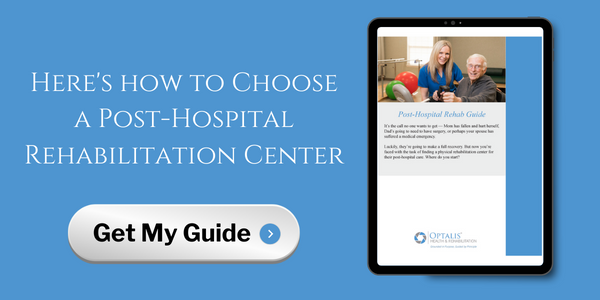Hello:
Our dad is just finishing up a stay in a rehab center and will be discharged home soon. It’s been a long road for him since he had his stroke, and we want to make sure we do everything we can to help him make a smooth transition back to his house.
Do you have any advice or tips you can share with us?
Kind Regards,
Staci
Transitioning Home Smoothly after a Rehab Stay
Dear Staci:
First it is important to remember that you aren’t going to be doing this on your own. The professional staff at the physical therapy center is there to help you through the process.
You should’ve already briefly discussed plans with the discharge planner, they will work closely with your dad’s interdisciplinary team of medical and therapy staff to determine the best way to handle his transition home, ensuring it is a safe and smooth process.
You will want to be as honest as possible with the therapy team including how much time you will be able to devote to being his caregiver. Your father may require a bit of ongoing help with things like transportation, lifting objects and medication management, making some hired part-time help necessary while he continues his recovery.
Tips for Planning the Transition Home
1. Home Assessment:
Now that your father will be going home after a stay in inpatient rehab, you’ll want to make sure the home is safe and properly set up for him. At Optalis communities, we offer a home assessment to our rehab patients before they transition home.
For the home assessment, a therapist accompanies your father to his home and evaluates the home environment. While there, the therapist will be able to see how well he is able to maneuver throughout the house. After the visit, they’ll be able to make recommendations to you and your father about any changes or adjustments that may need to be made.
Examples of what our therapist would examine during a home assessment visit:
-
- Maneuverability concerns:
Door width
Number of steps
Furniture arrangement - Safety concerns
Proper lighting
Handrail stability and placement
Fire extinguishers
Floor coverings - Accessibility concerns:
Hand held shower (if necessary)
Cabinet height
Closet organization
- Maneuverability concerns:
2. Medical Supplies and Equipment:
These needs will depend completely on your father’s health situation. He might have a few light exercises to complete at home or might be on special medication from his illness or surgery. Again, this will be something the therapy team or his doctor will go over with you.
Some questions you might find helpful are:
- Will my father require a cane, wheelchair, walker, special cushions, grab bars, or other assistive devices?
- Who will teach my father and I to use them correctly?
- Does my father need a hospital bed, shower chair, commode, oxygen supply, or other equipment or supplies? If so, where do I get these items?
- Will my father’s insurance pay for them?
- My father already has this (or similar) equipment at home. Can it be used again?
3. Medication Management: Have a plan in place for managing his medications including a list of medications, times and dosages from the rehab center, and an order from his physician for each one he will need to continue. You might want to consider setting up a pill box of some kind for him. Newer technologies are available that make this much easier to do. Some pill containers even send an alert or flash when it is time for a medication dosage.
4. Schedule Follow-up Appointments
Keeping your father’s recovery on track also means maintaining contact with his physicians. Make sure you know which physicians he needs to follow-up with and schedule those appointments before he leaves the rehab center.
5. Outpatient Therapy Plans
It isn’t uncommon for an older adult who has had a stroke to need to continue their therapy program at an outpatient rehab center. Make sure you check to see which centers are in his insurance plan and to schedule appointments before he leaves rehab. This will help prevent any disruption in his therapy regime.
6. Exercise Programs
Staying active is also important for people who are recovering from a stroke. Talk with your father to see what types of exercise interest him. It might be a walking program or swimming at the local fitness center. Once you have some ideas from your Dad, consult with his physician to get their approval.
Our final tip is to watch for signs of depression in your father. Those might include a loss of appetite, withdrawing from family or neglecting his personal appearance. It isn’t uncommon for seniors to battle depression after a serious illness like your father has experienced. Joining a stroke recovery support group might be one way you can help prevent your father from becoming depressed after his return home.
I hope this information is helpful, Staci! Best of luck to you and your father as you work together to tackle this next phase of his recovery.
Kind Regards,
Optalis Healthcare



